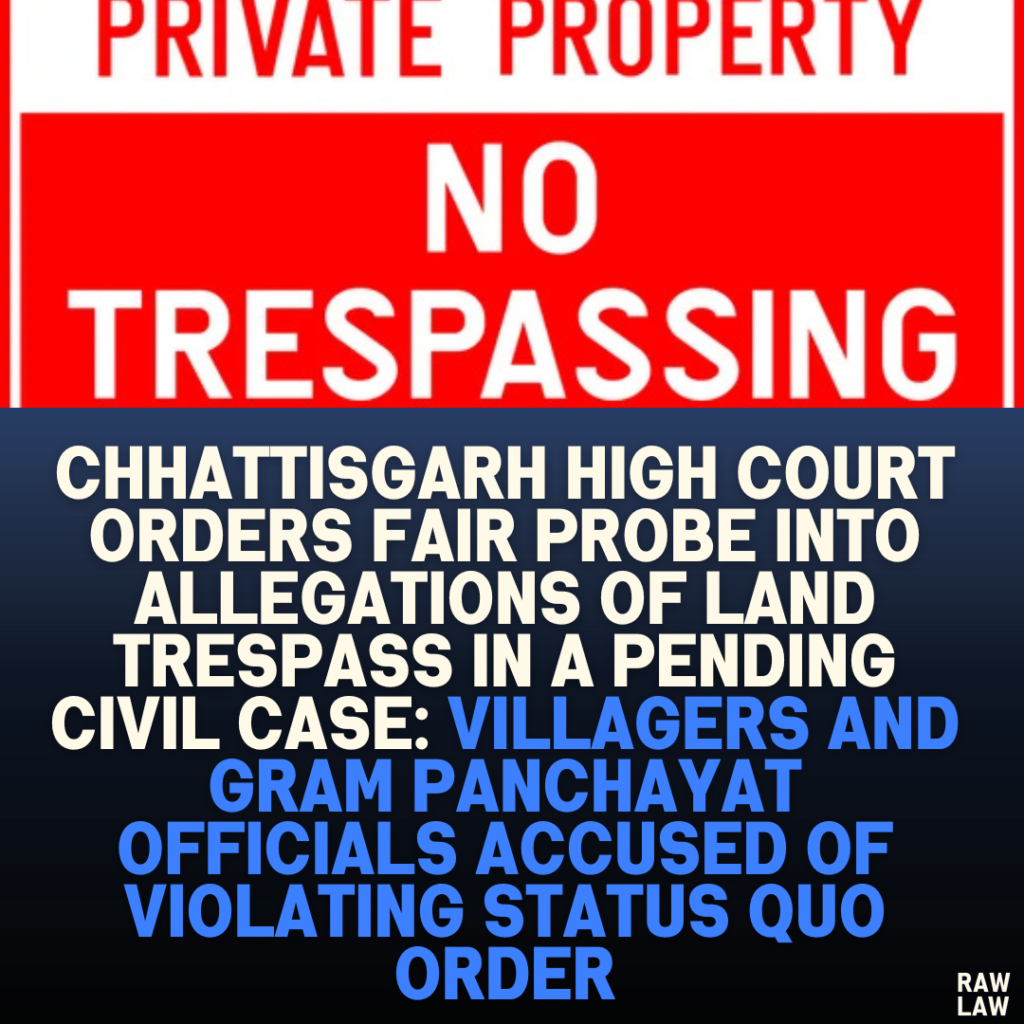Court’s Decision
The High Court of Chhattisgarh directed the Superintendent of Police, Surajpur, to ensure a fair and impartial investigation into both FIRs lodged concerning a land dispute. The Court ordered the Superintendent to monitor the investigations and ensure the timely submission of a police report under Section 173(2) of the Cr.P.C. to the competent court.
The petition, seeking either the transfer of the investigation to the Central Bureau of Investigation (CBI) or direct monitoring by the Court, was disposed of with these directions, considering the case’s facts and procedural requirements.
Facts
- Background of the Dispute:
The petitioner alleged that local villagers, in collaboration with officials of the Gram Panchayat, forcibly trespassed onto his agricultural land in village Joor on 22.10.2024, despite a status quo order passed by the Board of Revenue in a pending civil case over the land. The trespassers uprooted crops grown by the petitioner, asserting that the land belonged to the government. - FIRs Registered:
- FIR No. 588/2024 was lodged on 22.10.2024 by one Santosh Sahu against the petitioner and others.
- FIR No. 589/2024, filed by the petitioner on 23.10.2024, accused 16 individuals, including Santosh Sahu, of forceful trespass, destruction of crops, and stone-pelting, which allegedly caused injuries to the petitioner and others.
- Petitioner’s Grievance:
The petitioner claimed that the local police failed to take adequate steps for a fair investigation, prompting him to approach the Court under Article 226 of the Constitution of India.
Issues
- Whether the ongoing investigation into FIR No. 589/2024 by the local police is unbiased and adequate.
- Whether the investigation should be transferred to an independent agency such as the CBI to ensure fairness.
- How the court can balance allegations and counter-allegations while ensuring justice.
Petitioner’s Arguments
- Bias Alleged in Local Investigation:
The petitioner argued that local law enforcement was not conducting the investigation impartially. Despite multiple representations to the authorities, no effective action had been taken. - Request for Independent Investigation:
Citing the need for transparency, the petitioner sought the transfer of the investigation to the CBI or another independent agency. - Alternative Relief:
If the investigation was not transferred, the petitioner requested the Court to monitor the investigation to ensure justice. - Violation of Rights:
The petitioner contended that the actions of the respondents violated his property and personal rights, as crops were destroyed and injuries were caused during the altercation.
Respondent’s Arguments
- Adequacy of Current Investigations:
The respondents argued that the investigation was ongoing and being conducted in accordance with the law. - Competence of Local Authorities:
They maintained that there was no need for intervention as the local police were capable of conducting a fair and thorough investigation.
Analysis of the Law
- Fair Investigation:
The Court highlighted the principle of fairness in investigations, particularly in cases involving conflicting allegations. Ensuring impartiality and adherence to procedural requirements under the Cr.P.C. is crucial for justice. - Role of Supervisory Authorities:
The Court emphasized that the Superintendent of Police, being a supervisory authority, had the responsibility to ensure unbiased investigations. The directive to monitor investigations reflects the judiciary’s trust in established mechanisms while ensuring accountability. - Avoiding Unnecessary Transfers:
While transfer of investigation to a higher agency is an available remedy, it is not an automatic solution. The Court recognized that monitoring by senior police officials can achieve the same objective without disrupting procedural hierarchies.
Precedent Analysis
The judgment did not reference specific precedents but adhered to established principles of procedural fairness and accountability under the Cr.P.C.
Court’s Reasoning
- Neutral Investigation:
Given the allegations and counter-allegations, the Court found that transferring the investigation was unnecessary. Instead, ensuring fairness through monitoring by the Superintendent of Police would balance the interests of both parties. - Pending Civil Dispute:
The Court acknowledged the ongoing civil litigation regarding the land in question and underscored the need to respect the status quo order passed by the Board of Revenue. - Judicial Economy:
The Court chose to resolve the issue without directly intervening in the investigation, relying on established police procedures to handle the matter.
Conclusion
The Court disposed of the petition with the following directions:
- The Superintendent of Police, Surajpur, must ensure that investigations into both FIRs are conducted fairly and impartially.
- The Superintendent must monitor the investigations and direct the Investigating Officer to submit a police report under Section 173(2) of the Cr.P.C. to the competent court in accordance with the law.
Implications
- Strengthening Local Accountability:
The judgment reinforces the role of supervisory police officials in ensuring fair investigations without automatically escalating matters to higher agencies. - Judicial Oversight:
The Court’s approach strikes a balance between judicial oversight and procedural autonomy, highlighting the judiciary’s role in maintaining public trust in law enforcement. - Protection of Civil Rights:
By addressing the petitioner’s concerns and ensuring procedural fairness, the Court protected the petitioner’s rights while maintaining procedural integrity.
This judgment serves as a reminder of the importance of procedural safeguards and the supervisory role of senior police officials in contentious disputes.




Pingback: Delhi High Court Holds DDA in Contempt for Failing to Include Petitioner in Draw of Lots, Directs Officials to Explain Non-Compliance and Propose Remedial Measures, Emphasizes Binding Nature of Court Orders Over Policy Changes - Raw Law